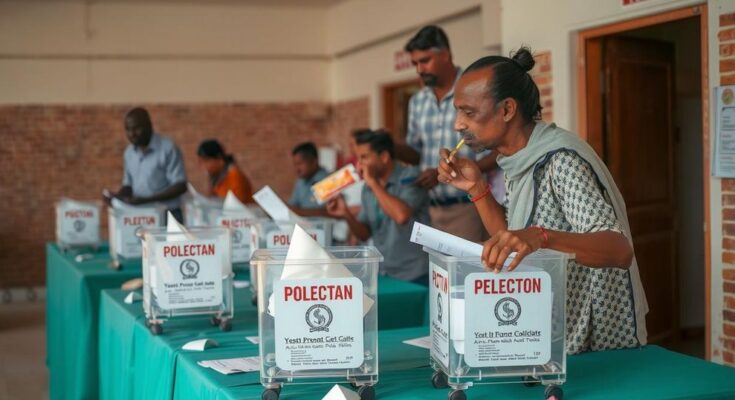Voting for Chad’s first parliamentary elections in over a decade is underway amid a boycott by opposition parties, citing pre-determined results. Despite low turnout in the capital, government officials assert high participation in military constituencies. Allegations of electoral fraud loom as the elections are framed by the government as pivotal for democratic transition following military rule.
Chad is currently conducting its first parliamentary elections in 13 years amidst claims from opposition parties of pre-determined outcomes. Voters are tasked with electing a new parliament, provincial assemblies, and local councils in a country grappling with impoverishment. Opposition calls for a boycott have resulted in low voter turnout, particularly in the capital, N’Djamena, where officials attributed this apathy to unfavorable weather conditions. By contrast, government representatives assert that voter engagement remains high in military and nomadic communities, highlighting the elections as a crucial step toward democracy following military rule. Opposition leaders maintain allegations of electoral fraud, as evidenced by reported missing ballots and pre-configured results, while some local citizens express a desire for substantive change in governance and accountability. The backdrop of potential fraud has been exacerbated by a fragile security environment characterized by insurgent threats and complex regional dynamics, particularly in light of the violence occurring in neighboring Sudan. The government portrays these elections as a significant stride toward democratization, despite the perceived shortcomings criticized by opposition factions.
The current parliamentary election in Chad represents a significant political event in a country that has not held such elections for over a decade. The transition to civil governance is critical, especially considering President Mahamat Idriss Deby Itno’s ascent to power following a military coup two years prior. The prevailing economic challenges, exacerbated by climate issues and social inequities, make this election pivotal not only for governance but also for addressing the pressing needs of citizens. The context of opposition boycotts and allegations of electoral fraud casts a shadow over the integrity of the process, raising concerns about the future of Chad’s political landscape.
In summary, the parliamentary elections in Chad are emblematic of the ongoing struggle between government authorities and opposition factions striving for legitimacy and representation. The low voter turnout linked to the opposition boycott underscores a significant disconnect between the administration and the populace. With allegations of fraud looming large, the elections signal a critical moment for Chad’s potential transition to democracy amidst a backdrop of socioeconomic hardship and regional insecurity. The outcome of these elections will likely shape the future trajectory of governance and civil rights in Chad.
Original Source: www.aljazeera.com




